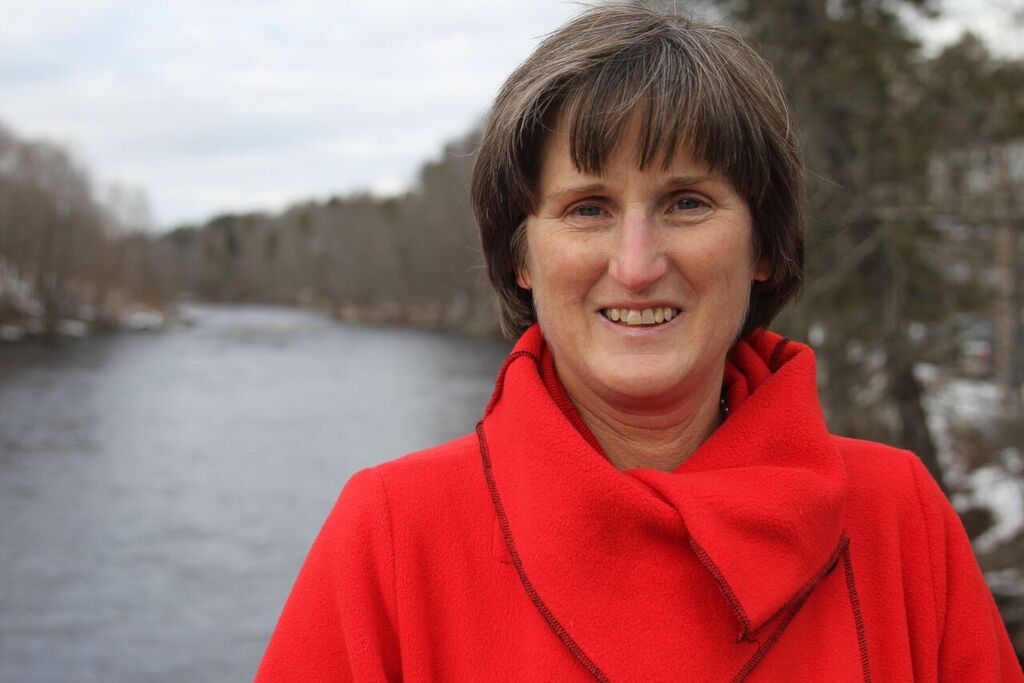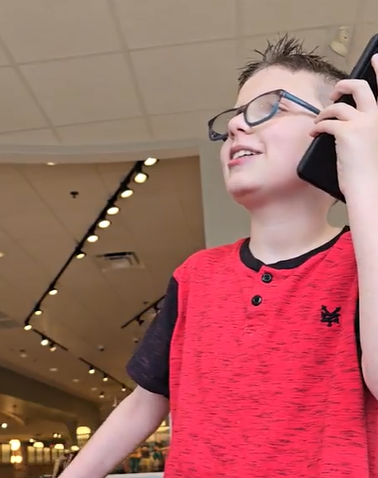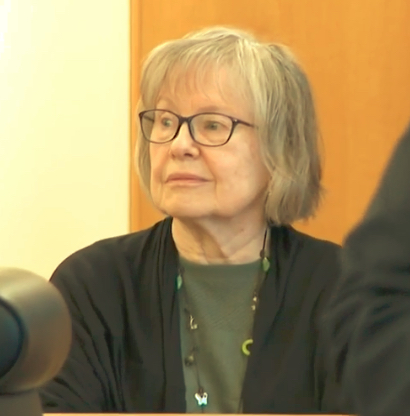By BOB CHAREST, InDepthNH.org
CONCORD – On the job a little more than two years, New Hampshire’s Child Advocate Moira O’Neill is finding that change is coming slowly in the way that the state protects its youngest residents.
“There are no quick fixes,” she said recently during a talk before about 30 professionals in Concord. “We need the system to be held accountable … but also nothing changes (quickly) like that.”
O’Neill On Friday released her second annual report on the state’s child protection system. She called the past year “generous and optimistic” for policy affecting children.
The state’s child protection system has been under fire for years, and efforts to add more workers to oversee cases has been slow-going, but money is now starting to flow.
O’Neill was appointed by Gov. Chris Sununu to the newly created position as head of the state Office of the Child Advocate on Jan. 30, 2018, in response to budget cutbacks and tragedies that rocked the state.
The fatal child abuse cases of Brielle Gage, 3, in Nashua in November of 2014 and Sadence Willott, 21 months old, in Manchester in September of 2015 were shocking in their own right, both killed by their own mothers, but their cases took on a more profound significance when it was revealed that both girls were under the supervision of the Division for Children, Youth and Families (DCYF), the state agency that is charged with protecting children and providing services to families under the state’s child protection statute.
The public rightly wondered how something like this could happen, especially when evidence pointed to continuing abuse by both mothers. How could children who were being monitored by professionals end up dead? Their cases triggered a highly critical outside review of procedures at DCYF.
The New Hampshire Child Welfare Quality Assurance Review performed by the Center for the Support of Families made 20 recommendations in its final report delivered in November 2016.
The report found that the Division for Children, Youth and Families was grossly understaffed, saw turnover among social workers that was well above national averages, and allowed investigations of abuse and neglect to remain open well beyond the 60 days required in DCYF’s own policy manual.
For a myriad of reasons, including overworked staff, a child-protection statute that sets the bar too high, and ineffective services, among them, the conclusion reached by the report was that the DCYF system is not effectively addressing the risks to children’s safety and well-being.
The state’s Office of the Child Advocate was created and enter O’Neill. It is her job to act as an “ombudsman” to monitor the state’s child protection system, including DCYF and juvenile justice services, to make sure children are being protected and treated in the best possible way.
Her three-person office is about to expand by another two and a half positions, and the approval back in May of Senate Bill 14, which creates a crisis response team and adds about a reported $18 million in services for child protection, will be adding to the state’s arsenal in helping children.
But as O’Neill pointed out in her talk Wednesday as a guest of the monthly “Coffee & Conversations” talk at UNH Franklin Pierce School of Law in Concord, change happens over time, sometimes a long time. Her talk was sponsored by the UNH Casey School of Public Policy, N.H. Bureau of Education and Training, and the N.H. Association of Certified Public Managers.
“First off,” she said, “the hiring process is very slow. We were very critical about that until we tried to hire people and it took us months and months just to get a job description approved. The bureaucracy rumbles in those areas. And then once you start hiring people, they’re in training for a lengthy period of time, so we actually saw a couple of district offices of DCYF start to crumble all over again because it looked like help was here, and help wasn’t here.”
Reforming a state’s child welfare system is all the more difficult when the advocate has no enforcement authority. O’Neill is in an oversight position, what amounts to an impartial role shining light where government isn’t acting as it should and hoping people will respond to that.
So far, people have responded to that.
In addition to SB 14, which restructures children’s behavioral health services, SB 6 was also approved last year and signed by the governor. That later bill approves nearly $2 million to add 27 child protective service workers this year and another $4.1 million next year for 30 more workers, some of it to be paid by federal funds. In addition, the bill also authorizes the hiring of an additional nine child protective service supervisors this year and another 11 next year, at a total cost of $2.5 million, most of that in state funds.
As part of SB14, the Department of Health and Human Services, the state agency that oversees DCYF, will establish case management for children’s mental health, establish a family support clearinghouse and advisory committee, establish a resource center for children’s behavioral health, and require providers to comply with evidence-based practice requirements. The rapid response team will include professionals who will be based out of 11 regional districts, with the goal of responding to a child in need within one hour.
In her annual report, O’Neill said, “Until all positions are filled and stabilized, caseworkers struggle with caseloads significantly higher than recommended. Even with enough caseworkers, children and families will continue to struggle if we do not have the right resources matched to clearly identified needs. There is great momentum forward for children in New Hampshire, we must maintain that movement.”
Some professionals have pointed out that first responders sometimes have a hard time dealing with out-of-control kids who end up in a jail cell rather than a treatment facility. David Parker, the director of Parker Academy in Concord, an educational facility for up to 50 students placed by their school districts because of their needs, said in a letter to the Concord Monitor last year that many of these children “have been through one or more of the following: trauma, neglect, suicidal episodes, intense psychiatric hospitalizations, criminal behaviors, substance abuse and repeated interventions. They may carry some or more of the following diagnoses: ADHD, borderline personality disorder, generalized anxiety disorders, depression, conduct disorder, learning disabilities and family dysfunction.”
Parker wrote that in the past, first responders not trained in trauma were not prepared with how to deal with children who were acting out. “My students have been placed in inappropriate holding cells that only exacerbated their condition and created more trauma,” Parker wrote.
O’Neill said that one of the interesting aspects of the establishment of the office of Child Advocate in Connecticut, where she worked, is how many agencies are involved in the care of a child, and how often none of them know what the other is doing.
In a review of a Connecticut case that resulted in a child’s death, “There were about 20 state agencies that were involved in that child’s life. Of those 20 state agencies that were involved in that child’s life, none of them had ever spoken to each other. They had no idea what the other was doing, So key in the development of that office there would be authority to access records and be able to talk to other people and in fact bring people to the table to say we’re all working with this one particular child. “What are you doing?’ … ‘What are you doing?’ How can we complement each other in our service to this child and this family? And that’s sort of been the impetus for a lot of offices like ours and that is something that we have tried to embrace in the Office of the Child Advocate here in New Hampshire.”
O’Neill sees the key to her job as access to confidential records and talking to other people.
“Similar key findings emerged in all of our work: the importance of open communications and relationships across all domains of children’s services, and the essential need for establishing interprofessional relationships,” she said. “Community-building is key to achieving the best outcomes for children. We must also acknowledge the barriers of personal and systemic bias that prevent children and families from being healthy and successful.”
As an example of organizations not communicating well, O’Neill adds this: “We saw a lot of disconnect between the Department of Corrections and the Department of Health and Human Services, the Division for Children, Youth and Families … The law requires certain things when a child is out of their home. They have to be reunified, or at least in a permanent home, within a year.
“But in order to do that, you have to have visits with the parents, the parents have rights, if the parents don’t show up at court, then you can’t terminate their rights until you go through that whole process, and it turns out the parent is off in the custody of the Department of Corrections and no one is talking about where are they and can we do visits, how does that happen, and when you show up to do visits, you don’t have the right outfit on or you didn’t sign the right piece of paper, and this child has gone through this whole emotional turmoil of getting there and there’s no visit.”
This might seem like a minor problem until you realize that by some estimates, there are 15,000 children in New Hampshire who have an incarcerated parent.
“We were able to help the Department of Corrections smooth some of those things out from the findings that we made, talking to parents and talking to kids. We’re in that sort of role, a conduit for facilitating smoother working of state government, and it’s great to be part of that,” O’Neill said.
O’Neill’s early training was as a nurse. She earned Master’s degrees in Nursing and Public Health at Yale University, and worked with children at the Yale Center for Children with Special Health Care Needs. She worked 11 years in Connecticut with that state’s Office of the Child Advocate. She received her Ph.D. from Yale, and her dissertation examined the state’s child advocate and ombudsman offices.
In New Hampshire, her associate director, Emily Lawrence, is an attorney who worked for over 10 years as a law clerk with the New Hampshire court system.
Since taking office, O’Neill has issued several reports including, in January, a review of restraint and seclusion in residential care settings; in December, a report on Granite Pathways Youth Treatment Center; and in November, a report on substance exposed infants. These reports and others are archived on the Child Advocate’s website at https://childadvocate.nh.gov
There are 20 child advocate offices around the country, and nearby, Vermont is considering legislation to create a child advocate. Maine and Connecticut have established offices.
“We’re not actually police,”she said. “We’re people who are looking at how the system is functioning. In terms of access to information, you can imagine even if you’re not familiar with these areas in state government, but all the information around a child … child protection, juvenile justice … this is highly confidential information. We have information about the child, we have information about the child’s parents, their siblings, and this is information that could be really damaging to a child as they grow. This is not information that we need everyone to know about. So having someone who can be trusted, who is impartial and can access that information, who is not only a voice for children but is a set of eyes for the rest of the public, and then our statute allows us to share information within the team of an individual child if it’s relevant to that child’s success, we can share that information.”
As for creating change within the system, O’Neill noted, “We get used to a way of doing work. We get used to being overloaded. When we’re overloaded, we start to step over things. These are things we call workarounds. We start becoming immune to some of the weaknesses of the system so not only do we need more people, we have to up-train and we have to raise awareness to the higher standard of how they are supposed to perform. It’s not going to happen overnight.
“In time we have to be able to talk positively about the change and encourage people to think that this is an agency that’s in transformation and will be an exciting place to work because what we found is the same thing that happened in Maine. They had a couple of tragic deaths right after New Hampshire did and they have gone through a whole transformation, and they have approved funding for hiring a whole bunch more case workers. Massachusetts is hiring more. Massachusetts and Maine pay substantially more to their case workers than New Hampshire does, so how do we attract people to work in these positions when it is so hard, and I’d like to think people are attracted to these positions when they see a system that’s in transformation and is committed to doing a better job. So, we have to support that but also honor the need for this independent oversight that’s going to point out where it’s not working and how we push it forward.
Her advice: “I would say be patient but don’t tolerate a service that’s not adequate. Always we tell everyone who calls our office to call that case worker, call the case worker’s supervisor, call the administrator, call the central office because the communication has to happen.”
O’Neill supports confidentiality within the system and believes in using the office as a platform to inform the community when change is needed.
“Take for instance the death of a child. We try not to use names when we report,” she said. “We have authority to see this information. We have authority to share the information. But we’re always mindful that every piece of information that we make public is going to affect a survivor. There’s always more family. If someone is killed by their parent, it’s a terrible situation. Maybe there’s a surviving sibling that still has to live in that scenario and people are going to wonder about what’s going on. We really have to tread carefully about that. I think opening up children’s cases particularly in child protection, you’re wondering are you protecting the parent offender or are you protecting the child? At this point, I feel like the Office of the Child Advocate can serve as those eyes, to look at it and make sure that the system is working properly and then share information when it’s not.
“It requires a great deal of trust, which is why it is so important to our office to be independent and that’s also been challenged – our independence. We can’t be part of the system. We can’t be politically connected. We can’t have any of those connections that would impact our impartiality and our ability to be able to look at something and report it as it is. So while journalists are really important, we would hope that they would value the information and trust the information that comes out of our office, which is a big ask to trust someone who works in state government,” she said.
The Child Advocate’s website is https://childadvocate.nh.gov/




